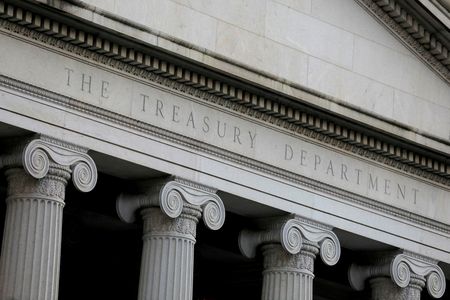By Davide Barbuscia
NEW YORK (Reuters) -Rating agencies Moody’s and Fitch expect the U.S. Congress will likely reach an agreement on a new debt limit before the Treasury drains resources to stave off a debt default, but warned that an extended political gridlock could ultimately impact the United States’ top credit rating.
The U.S. government hit its $31.4 trillion borrowing limit on Thursday, amid a standoff between the Republican-controlled House of Representatives and President Joe Biden’s Democrats.
Treasury Secretary Janet Yellen informed congressional leaders including House Speaker Kevin McCarthy that her department had begun using extraordinary cash management measures that could stave off default until June 5.
Recurring legislative standoffs over the debt limits this last decade have largely been resolved before they could ripple out into markets. That has not always been the case, however: A protracted standoff in 2011 prompted Standard & Poor’s to downgrade the U.S. credit rating for the first time, sending financial markets reeling.
Rating agencies Moody’s and Fitch both have a triple-A rating for the United States – the highest credit quality status they can assign to a borrower. S&P Global’s sovereign rating for the United States is ‘AA+’, the second highest rating by the agency.
Investors look at credit ratings as one of the metrics used to establish the risk profile of governments and companies.
“Given an extremely fractious political environment, we anticipate an agreement will likely only be reached very late or in an incremental fashion, potentially contributing to flare-ups in financial market volatility,” Moody’s Investors Service said in a note on Thursday.
It said it expected the debt limit impasse to be solved before a missed payment occurs and that, should the Congress fail to reach an agreement on the debt limit, the U.S. government would still likely continue to meet its debt service obligations on time and in full, giving them priority over other payments.
Richard Francis, a senior director at Fitch Ratings, told Reuters he also expected a debt limit agreement would be reached before a so-called X date, which is when the government exhausts its cash and borrowing capacity, as it has been the case in similar circumstances in the last decade.
“We do recognize obviously that there is a tail risk that they won’t be able for whatever reason to come to some kind of agreement by the X date … and it’s not clear to us … if the government has the ability or the willingness to prioritize payments,” he said.
Should the government be unable to pay some of its obligations, he added, “that would not be consistent with what we would expect from a triple-A rating.”
Moody’s said in its note that while a U.S. missed interest payment was unlikely, it would consider it an event of default.
A potential rating downgrade would be limited, leaving the government close to its current triple-A status due to its capacity to repay debt, Moody’s said, but it would likely also affect the ratings of other borrowers such as companies and financial institutions exposed to the U.S. government.
S&P Global said in its last published report on the U.S. credit rating, dated March last year, that it expected Congress to continue to raise or suspend the debt ceiling, despite “political brinkmanship” between the executive and legislative branches of government.
(Reporting by Davide Barbuscia; Editing by Chizu Nomiyama, Mark Potter and Michael Perry)

